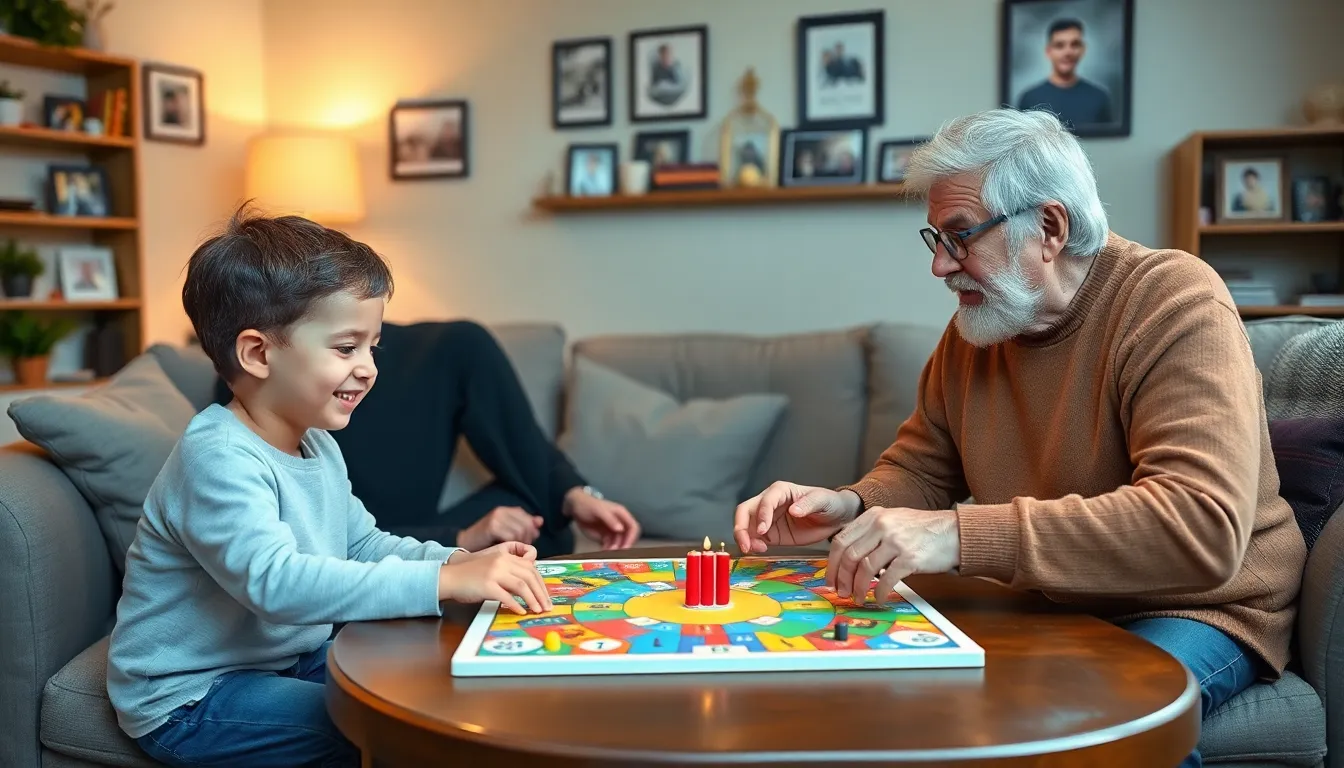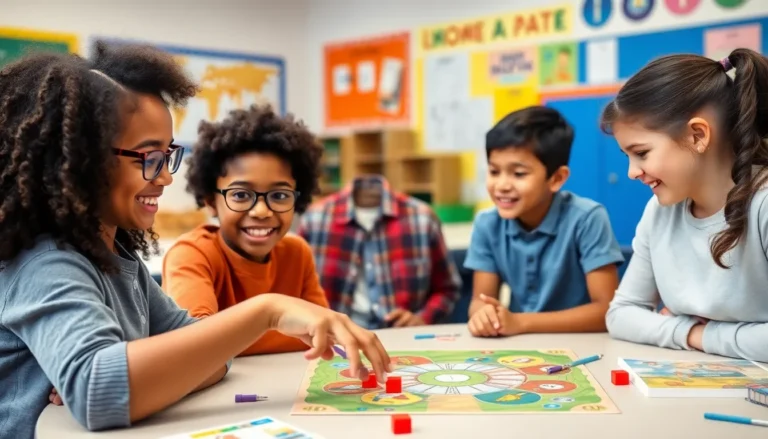In a world where age is just a number, games have become the universal language that brings everyone together. Whether you’re a sprightly toddler or a wise grandparent, there’s a game out there that’ll tickle your fancy and spark joy. Imagine the laughter echoing through the living room as a family battles it out in a board game showdown or the thrill of a digital adventure that spans generations.
Table of Contents
ToggleOverview of Games for Diverse Ages
Games for various ages foster connections between family members and friends. They create opportunities for bonding through shared experiences. Board games appeal to younger children with vibrant colors and simple rules, while strategic games engage teens and adults.
Digital games cater to different skill levels, ensuring everyone can participate. Many platforms offer multiplayer options, promoting teamwork and collaboration across generations. For instance, casual mobile games provide quick, accessible fun, making them popular among all age groups.
Variety enriches this landscape. Educational games stimulate young minds, enhancing learning while entertaining. Cooperative games cultivate camaraderie, emphasizing collective victory over individual success.
Older adults often enjoy classic games that evoke nostalgia, demonstrating the timelessness of friendly competition. Trivia and word games challenge cognitive skills, making them entertaining and beneficial.
Families frequently gather around game nights, sharing laughs and creating lasting memories. Each game serves as a vehicle for connection, reinforcing relationships through play. Additionally, themed games often spark conversations about personal interests and experiences, bridging generational gaps.
Diverse age groups find engagement through various game formats. The interactivity and adaptability of games ensure they remain a vibrant part of family life, regardless of age.
Benefits of Multi-Age Gaming

Multi-age gaming offers extensive benefits for players. Games stimulate cognitive growth and enhance social skills, making them an invaluable asset in family dynamics.
Cognitive Development
Games engage different areas of the brain, promoting critical thinking and problem-solving skills. Younger children learn basic concepts like counting and strategy from simple games. At the same time, older players refine their analytical abilities through complex strategies. Various games challenge cognitive functions, like memory retention and pattern recognition, leading to overall mental agility. Multigenerational play encourages collaborative learning, allowing every participant to share their unique perspectives. The blend of various skill levels encourages knowledge exchange, ensuring continuous cognitive development for all involved.
Social Interaction
Gamers of all ages experience enriched social interactions during gameplay. Through shared victories and defeats, players bond and strengthen relationships. Games often promote teamwork and communication, allowing individuals to work together toward a common goal. Parents can observe their children’s social development in real time, enhancing communication skills and emotional intelligence. Adults can learn to navigate diverse social dynamics while engaging with younger family members. By providing a platform for conversation and shared experiences, games create lasting connections that transcend age barriers. Overall, multi-age gaming cultivates an inclusive environment where social skills naturally flourish.
Categories of Games for Diverse Ages
Various categories of games engage players of all ages, offering something unique for everyone.
Board Games
Board games provide a tactile experience that often brings families together. Bright colors and engaging themes capture younger children’s attention while strategic elements intrigue teens and adults. Classic board games like Monopoly and Scrabble foster friendly competition and discussion among players. Newer options such as Codenames and Ticket to Ride add modern twists to family game nights. Each game offers opportunities for players to develop critical thinking and social skills through interaction.
Video Games
Video games cater to a wide range of interests and skill levels across generations. Many platforms enable multiplayer modes, allowing family members to collaborate or compete while playing. Titles like Mario Kart and Overcooked encourage teamwork and communication in a fun environment. Parents can easily monitor their children’s progress and involvement, ensuring a healthy balance between entertainment and responsibility. Whether educational or purely for fun, video games stimulate cognitive skills and foster deeper connections among players.
Outdoor Games
Outdoor games promote active engagement and physical fitness, making them ideal for family gatherings. Classic activities like tag or hide-and-seek invite participation from toddlers and grandparents alike. Structured games such as soccer or capture the flag enhance teamwork and sportsmanship among teens and adults. Seasonal sports like frisbee or bocce ball offer versatile fun, encouraging everyone to step outside and enjoy the fresh air. Families that play outdoors together often strengthen their bonds while enjoying the benefits of exercise.
Choosing the Right Game for Different Age Groups
Selecting games for various age groups enhances enjoyment and engagement for everyone involved. Each stage of development offers unique interests and skills, guiding the choice of appropriate games.
Toddlers
Toddlers thrive on simple games with bright colors and basic rules. Interactive board games like “Candy Land” or “Chutes and Ladders” attract their attention while promoting turn-taking and color recognition. Additionally, tactile toys, such as large building blocks, foster creativity and fine motor skills. Games that involve movement are beneficial as well. Activities like “Duck, Duck, Goose” or simple tag encourage physical activity and social interaction. These experiences lay the groundwork for essential cognitive and social skills.
School-Aged Children
School-aged children enjoy games that challenge their growing intellect and foster strategic thinking. Board games like “The Game of Life” or “Guess Who?” engage critical thinking while providing opportunities for friendly competition. Educational games, such as “Scrabble” or “Math Dice,” stimulate learning in a fun environment. Team-oriented games also promote teamwork and communication. Outdoor activities like soccer or capture the flag deliver physical exercise alongside social skill development. Balancing fun and education ensures enjoyment while nurturing essential life skills.
Teens and Adults
Teens and adults appreciate games that involve strategy and deeper storytelling. Cooperative games like “Pandemic” or resource management games such as “Catan” invite collaboration while testing problem-solving skills. Video games, particularly those with multiplayer capabilities, enhance communication and engagement. Classics like “Mario Kart” or strategic options like “Fortnite” promote social interactions in a virtual environment. Engaging in game nights fosters bonds among family members, creating shared memories that strengthen relationships and promote laughter across generations.
Tips for Facilitating Multi-Age Game Sessions
Establish clear rules to ensure everyone understands the game dynamics. Simplified instructions benefit younger players while still engaging older participants. When introducing a game, demonstrate the gameplay to enhance comprehension across ages. Create an inviting atmosphere by encouraging players to ask questions and share tips.
Select games that promote collaboration rather than competition. Cooperative games like “Forbidden Island” cultivate teamwork, allowing players to strategize and support one another. Offer a variety of game types and styles to cater to different interests and skill levels. Consider including classic board games alongside modern digital options to maintain broad appeal.
Encourage players to adapt games to accommodate all ages. Allow older children to guide younger ones during gameplay, reinforcing leadership and mentorship. Foster inclusivity by rotating turns, giving everyone a chance to participate actively while preventing any player from feeling sidelined.
Utilize timers or suspenseful elements to heighten excitement during gameplay. Activity-based games also provide opportunities for physical movement, keeping energies high and spirits up. Create a schedule for game sessions, ensuring equal time for each activity to maintain interest and engagement.
Incorporate snacks and breaks to keep energy levels sustained. Social interactions during these breaks facilitate bonding and create a relaxed environment. Actively track players’ preferences; note which games yield the most enthusiasm, adjusting future game night selections accordingly.
Emphasizing flexibility and inclusivity fosters a warm and engaging game session for everyone. Each game offers an opportunity for connection, reinforcing relationships through shared experiences and laughter.
Games serve as a powerful tool for bridging generational divides and fostering connections among family members and friends. They create an environment where laughter and shared experiences thrive, enriching relationships and making lasting memories. With a wide variety of options available, families can easily find games that cater to different ages and interests.
The benefits of multi-age gaming extend beyond mere entertainment. They enhance cognitive development and social skills while promoting teamwork and communication. By selecting the right games and creating an inclusive atmosphere, families can ensure that everyone participates and enjoys the experience. Embracing the joy of gaming together not only strengthens bonds but also cultivates a sense of community that lasts a lifetime.



